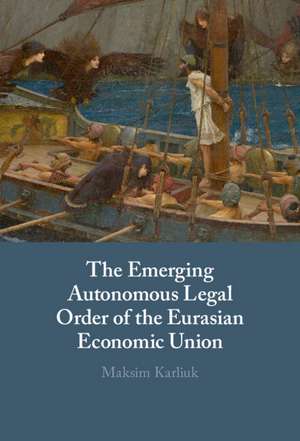The Emerging Autonomous Legal Order of the Eurasian Economic Union
Autor Maksim Karliuken Limba Engleză Hardback – 5 iul 2023
Preț: 661.55 lei
Preț vechi: 726.98 lei
-9% Nou
Puncte Express: 992
Preț estimativ în valută:
126.59€ • 131.91$ • 104.81£
126.59€ • 131.91$ • 104.81£
Carte disponibilă
Livrare economică 14-28 martie
Livrare express 27 februarie-05 martie pentru 33.96 lei
Preluare comenzi: 021 569.72.76
Specificații
ISBN-13: 9781316514061
ISBN-10: 1316514064
Pagini: 300
Dimensiuni: 237 x 158 x 23 mm
Greutate: 0.55 kg
Editura: Cambridge University Press
Colecția Cambridge University Press
Locul publicării:Cambridge, United Kingdom
ISBN-10: 1316514064
Pagini: 300
Dimensiuni: 237 x 158 x 23 mm
Greutate: 0.55 kg
Editura: Cambridge University Press
Colecția Cambridge University Press
Locul publicării:Cambridge, United Kingdom
Cuprins
Introduction; 1. Autonomy of a legal order-Odysseus's vessel; 2. The establishment of the Eurasian Economic Union; 3. Supranational and intergovernmental functioning of the EAEU; 4. The powers of the EAEU: from express to implied; 5. Law of the union and autonomy; 6. EAEU judiciary as the guardian of the autonomous legal order; 7. Conclusion: What autonomy? Odysseus's vessel redux.
Recenzii
'This book offers an excellent expert analysis of the legal regime of the Eurasian Economic Union. It is thoroughly researched and informative, zooming in on critical legal issues and providing a nuanced and stimulating discussion. This should be an essential reading for anyone who wants to understand the workings of Russia's flagship integration project in Eurasia.' Rilka Dragneva, University of Birmingham
'The Emerging Autonomous Legal Order of the Eurasian Economic Union offers an in-depth critical appraisal of the functioning of the EAEU and of the structure and essential characteristics of the EAEU legal order. It contains an extensive analysis of the jurisprudence of the EAEU Court and draws parallels with the case law of the Court of Justice of the European Union.' Kirill Entin, Court of the Eurasian Economic Union and National Research University Higher School of Economics
'In this book Maksim Karliuk explores the legal structure and operation of the Eurasian Economic Union, an organization that is frequently discussed but rarely subjected to such sustained and detailed analysis. This is an important work on one of the most influential international institutions in the Eurasia region.' Chris Miller, The Fletcher School, Tufts University
'The book offers a comprehensive and in-depth analysis of the Eurasian Economic Union. It draws an interesting comparison with the EU integration process through addressing the complex question of whether the EAEU, similarly as the EU, can be qualified as an 'autonomous legal order'.' Inge Govaere, Ghent University and College of Europe
'Building on a variety of legal approaches, this book offers a systematic and profound analysis of the Eurasian Economic Union's legal order and its 'fragile autonomy'. In light of its strong comparative dimension and interdisciplinary elements, it will be a key reference point not just for legal experts, but also for any scholar interested in this Russia-driven regional integration project.' Laure Delcour, Université Sorbonne-Nouvelle, Paris
'The Emerging Autonomous Legal Order of the Eurasian Economic Union offers an in-depth critical appraisal of the functioning of the EAEU and of the structure and essential characteristics of the EAEU legal order. It contains an extensive analysis of the jurisprudence of the EAEU Court and draws parallels with the case law of the Court of Justice of the European Union.' Kirill Entin, Court of the Eurasian Economic Union and National Research University Higher School of Economics
'In this book Maksim Karliuk explores the legal structure and operation of the Eurasian Economic Union, an organization that is frequently discussed but rarely subjected to such sustained and detailed analysis. This is an important work on one of the most influential international institutions in the Eurasia region.' Chris Miller, The Fletcher School, Tufts University
'The book offers a comprehensive and in-depth analysis of the Eurasian Economic Union. It draws an interesting comparison with the EU integration process through addressing the complex question of whether the EAEU, similarly as the EU, can be qualified as an 'autonomous legal order'.' Inge Govaere, Ghent University and College of Europe
'Building on a variety of legal approaches, this book offers a systematic and profound analysis of the Eurasian Economic Union's legal order and its 'fragile autonomy'. In light of its strong comparative dimension and interdisciplinary elements, it will be a key reference point not just for legal experts, but also for any scholar interested in this Russia-driven regional integration project.' Laure Delcour, Université Sorbonne-Nouvelle, Paris
Notă biografică
Descriere
An original systematic assessment of the legal order of the Eurasian Economic Union, examining it as another iteration of post-Soviet integration.
